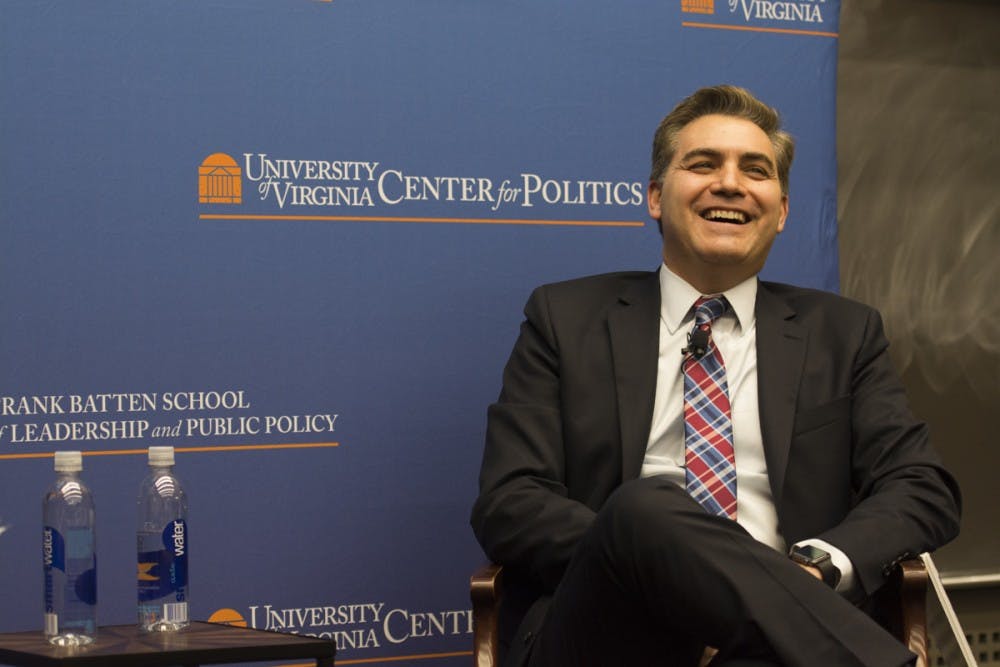As part of the Batten School and the Center for Politics’ National Symposium Series on Democracy — which hosted nationally recognized speakers including Martin Luther King III, Donna Brazile and Adam Schiff — the school hosted an event last night with the Chief White House Correspondent for CNN Jim Acosta. Titled “The Fourth Estate: Enemy of the People?” the talk focused on Acosta’s experience as part of the press force within the White House, specifically focusing on how that has changed during President Donald Trump’s Administration.
Acosta — who was also a CNN White House Correspondent during Barack Obama’s presidency — is well known in the public eye for the disputes he has with Trump, as well as other members of the president’s staff in briefings and press conferences. Most notably, Acosta had his White House press credentials revoked in November 2018 after a contentious exchange with Trump during a news conference — in which the President called Acosta a “rude, terrible person.”
More than 350 people gathered in Wilson Hall to hear Acosta speak — including students, faculty and many Charlottesville community members.
The first portion of the event was a discussion between Acosta and Center of Politics Director and Professor of Politics Larry Sabato. Acosta was introduced to the audience with a brief history of his life and a video showing the various confrontations he has had with the president. During the second half of the event, the floor was opened to the audience to ask Acosta any questions they had.
As someone who has worked with closely with Acosta, as well as other members of the press, Sabato felt it was important to provide an outlet to show students and the Charlottesville community that the press is not the “enemy of the people” that Trump claims it to be.
“It’s obvious to everybody, whatever their political views, that our system isn’t working very well, or it’s certainly not working the way it used to,” said Sabato. “Part of it is the terrible polarization but part of it is also that people, many at least, are not keeping up the way they used to. We feel an obligation as higher education to give people an opportunity to learn about all the divisions and dimensions of democracy.”
Acosta shared that he holds a similar view about the current political partisanship in our nation. After a student asked a question about the friction in our country between Democrats and Republicans, he shared his opinions on the “hyper partisan war right now in this country.”
“I just think that we have gotten so far away from the way that I was raised in this country — and in this state [Virginia] — which is you do love thy neighbor and you do try to see people for who they are deep down, and not what their favorite sports team is or who their political party might be at that particular moment,” said Acosta. “We’ve got to get back to that in this country.”
Acosta’s methods of reporting and combatting Trump have led to accusations of biases in his reporting. Adam Kimelman, fourth-year College student and former president of the College Republicans, attended yesterday’s event and commented on how Acosta’s outward disagreement with Trump possibly affect his reporting.
“I think the media definitely has its biases,” said Kimelman. “I think a lot of times its not perceived biases… every decision you make has a change — what you include in a story, what you don’t include in a story. Sometimes, it’s not intentionally like I want to crush conservatives or I want to go after liberals if you’re Fox News. It's kind of just subconscious.”
During the Aug. 11 and 12, 2017 white supremacist rallies in Charlottesville, Acosta was in Washington D.C., and told The Cavalier Daily in an interview that he repeatedly questioned Trump about what he believed to be the driving forces behind the events of the rallies.
“He tried to say that there were both sides to blame for what happened in Charlottesville when clearly the white supremacists and the Neo-Nazis that came to Charlottesville were responsible for what happened,” said Acosta. “I mean that’s just unmistakable.”
According to Acosta, it was his question that prompted Trump to say there were “fine people on both sides” of the rally.
“At that point I said to him, and I did not phrase this in the form of a question — getting back to what is the proper behavior of a journalist — I said, ‘No there are no fine people in the Nazis,’” said Acosta. “When it’s a matter of right versus wrong there aren’t two sides to the story.”
Despite how Acosta — along with many other reporters in the White House press room — is repeatedly called “fake news,” “the enemy of the people” or “a terrible organization” by the President himself, Acosta says he continues to ask tough questions of our elected leaders.
When asked by a student in the audience about the future of journalism and how students who “know they want to be journalists” should go about follow that dream, Acosta responded that he is positive about journalism careers right now.
According to Acosta, “this is a great time to be a journalist.” He told the student that he used to discourage people from entering journalism because of the difficulty and time commitment, but now he believes it is the right time to get involved in the industry.
Although Acosta says he understands how today’s journalism comes with hardships that range from yelling and screaming to middle fingers and death threats, he hopes people can understand the importance of the fourth estate in our democracy. Similarly, Sabato believes the purpose of the event was to show people the human side of the press and everything they do to uncover information for the public.
“People need to understand that even if they are pro-Trump, they need to be pro-press,” said Sabato.







